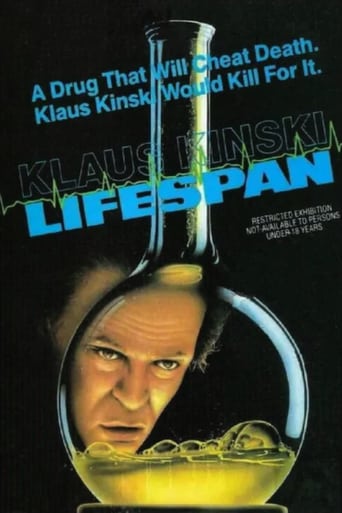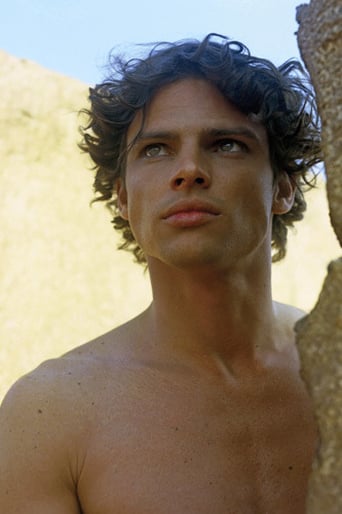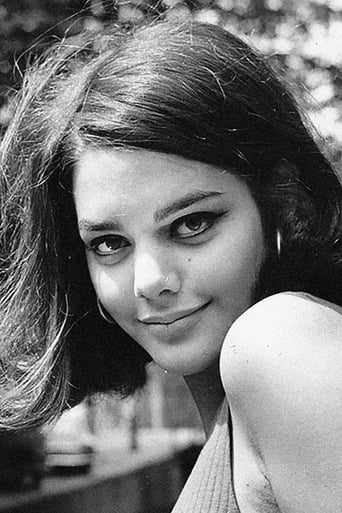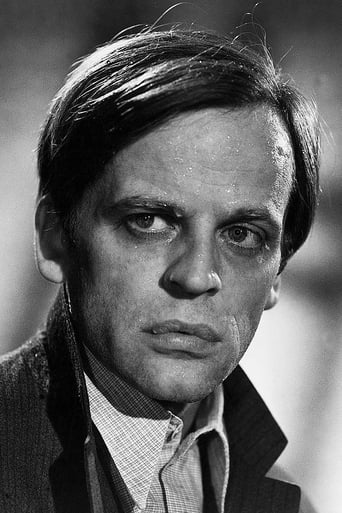

Lifespan (1975)
Cult icon Klaus Kinski features in this dark and intriguing existential thriller. He plays the mysterious "Swiss Man" - ruthless industrialist Nicolas Ulrich - who is obsessed with a search for the elixir of life. He tricks a young American scientist into joining him on his demonic quest. A quest that ends in suicide, death and madness. The story takes place in the atmospheric European city of Amsterdam. Its winding alleys and ancient canals trap the characters in a labyrinthine maze as they find themselves manipulated like figures on a giant chess board.
Watch Trailer
Cast
Reviews
Yawn. Poorly Filmed Snooze Fest.
Powerful
Excellent and certainly provocative... If nothing else, the film is a real conversation starter.
what a terribly boring film. I'm sorry but this is absolutely not deserving of best picture and will be forgotten quickly. Entertaining and engaging cinema? No. Nothing performances with flat faces and mistaking silence for subtlety.
"Lifespan" is a partially successful film, beset by too naive dramatic turns and dialogues in view of the serious issues addressed in its plot (a young doctor who aspires to immortality and achieve the status of God, while his words reveal a high level of gerontophobia) and gratuitous eroticism that mostly adds to expose the anatomy of the leading lady, a character that contributes little to the plot. However, the film covers several topics concerning the survival of humanity which are strongly current today, making this drama of scientific anticipation (rather than science-fiction) a visionary film, albeit on a small scale. "Lifespan" addresses the global status of drug factories, which are supposed to alleviate humanity's ills. Today financial gain has been imposed upon people's welfare, supported by a "natural selection" of the fittest based on the individuals' riches, which, as anybody knows, are the results of many persons' greed and hoarding of material goods of our planet, which by nature (and elementary philosophical reasoning) belong to everybody. Moreover, "Lifespan" speaks of vanity rather than mankind's need of immortality. The obsession of the three main males in the plot with the pretty and beautiful Anna is a reflection of man's desire to "entrap" this (so overrated) skin-deep stage of life, while the elderly are called "the almost dead". In this age of mutilating surgeries, pseudo- transformations of gender, anatomy and curves, "Lifespan" is very much in force and delights in the beautiful faces and bodies of its dream cast, which reunites three icons of the counterculture beauty of the 1970s: American Hiram Keller, French Tina Aumont and West German Klaus Kinski. If one is a bit tolerant of the limitations I have noted, you will find a high level of inspiration that often reaches moments of fascination, that, although not maintained throughout the duration of the film, constitute a time capsule of an era, of a way of thinking and seeing the world that anticipated how our own would be. Recommendable.
Here's a bizarre thriller from Holland which doesn't really go anywhere despite an intriguing premise - and bizarrely ends up caught up in the dream world of a raving maniac! LIFESPAN is similar to films like FRAGMENT OF FEAR and SPIDER LABYRINTH in its depiction of an outsider finding himself going deeper and deeper into a world of mystery and death but it doesn't come close to the power and effectiveness of those two movies. Despite being classified in the "horror" section, the only true horror comes from the scene of a gruesome hanging, and otherwise this sits firmly in the mystery/thriller genre.The plot doesn't really ever get too deep but despite this, I still found myself confused by the film. This is a shame as it starts off well, with much promise of things to come, and an oppressive air of mystery as well. The Amsterdam locations are used very well to give the film an unusual, European look and the acting isn't bad either, although the post-dubbing is occasionally echoey and unrealistic. Hiram Keller takes the lead role of the young scientist caught up in the intrigue and does a pretty good job of it in my opinion, although his droning voice-over is pretty sleep-inducing. Tina Aumont is good as the femme fatale, and Euro-favourite Klaus Kinski also pops up as a mystery Swiss who hangs around on street corners mysteriously.Sadly as the film goes on, it begins to become apparent that nothing much is going to happen in it, despite vain attempts to throw a bit of kinky sex and grave-robbing into the brew to make it appeal to exploitation fans. In the end it becomes irritatingly insubstantial and the lack of any real, interesting, explanation for the mysterious events is pretty annoying. LIFESPAN is a missed opportunity which should only be watched at a last resort for the spooky atmosphere it contains, and at least it's short. But the lack of any decent action or plot development is very boring and its one of the few films that has nearly sent me to sleep.
Despite the rather lethargic pace, this is an absorbing conspiracy thriller on an existentialist theme. As it was shot in English, even if most of the voices were eventually re-dubbed at a later stage, Fons Rademakers' heavy accent makes his dialogue hard to understand at times! Anyway, many have found Hiram Keller's inexpressive performance a detriment to the film but I rather liked it (and so, apparently, does director Whitelaw!); the fact that a lot of the exposition is imparted through narration has been criticized as well, but I also thought this worked very well for the film. Much has also been said about the notorious (and oft-censored) bondage scene involving Tina Aumont (well cast here): actually, it's very discreetly done and pretty short in itself! And though Klaus Kinski doesn't get to exert his acting muscles a great deal, his Mephistophelean presence adds to the film's uniquely disquieting aura. Besides, the Amsterdam setting (and Eddy van der Enden's lugubrious photography of it) is a big plus, as is Terry Riley's electronic score.Whitelaw's rather choppily edited interview and full-length Audio Commentary (moderated by Mondo Macabro's Peter Tombs) are very interesting: the director explains several points which may not have been very clear and draws attention to the irony which is present in his script. Besides recounting many an amusing anecdote about the production (Kinski turning up on set dressed as a Mexican bandit and Whitelaw having to calmly persuade him that his role of "The Swiss Man" was somewhat different!; Kinski's minimal dialogue was also the result of his dislike of the script, whereupon whole chunks of lines he was supposed to say were unceremoniously thrown out!) and the censorship problems the film encountered (the director tried to convince the U.K. censors that the bondage scene was relevant to the main theme by arguing that this kinky act highlighted a woman's breasts which, by storing milk, are themselves a symbol of immortality!). Whitelaw also puts the unresolved and apparently downbeat ending in the context of the film's theme by saying that a picture about immortality, i.e. the desire that one's life doesn't come to an end, could never have a conventional finish as that would mean it was actually embracing death! Interestingly, he mentions too that Roman Polanski (who was a member of the jury where LIFESPAN won an award) had admired the picture a lot - and this was eventually reflected in his own next film, THE TENANT (1976), to which it bears a striking resemblance plot-wise (though itself based on a work of fiction by Roland Topor, of which Whitelaw was completely unaware at the time)!!
As the previous review states, "Lifespan" owes little to the genres of suspense or horror. Instead, it's a brainy, absorbing drama that's rewarding to those who give it a chance. Hiram Keller plays an American scientist picking up on the research of a colleague who committed suicide, and discovers he was on the verge of finding a cure to the aging process. Klaus Kinski is excellent (as always) in a small role as the owner of a sinister pharmaceutical company. The film plays out much like the early works of David Cronenberg (minus the violence and special effects); his fans should appreciate this. The only drawbacks, really, are an ambiguous ending (which actually fits the rest of the film), and the sometimes-corny, self-conscious voice-over narration. 3 stars out of 5.


